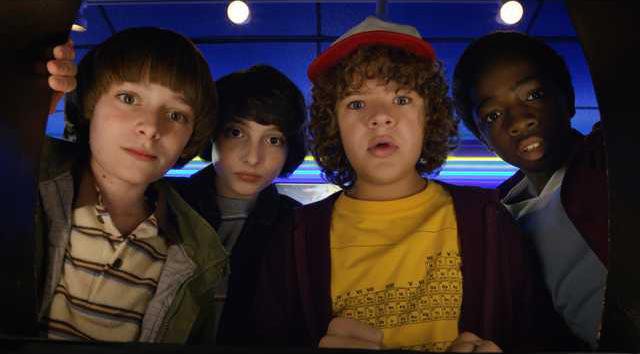Members of the Stranger Things cast reportedly just received pay raises sure to turn their lives upside down.
According to The Hollywood Reporter, the shows actors have been divided into three different tiers.
The adult stars, Winona Ryder (Joyce) and David Harbour (Jim Hopper), form the first tier of actors and will reportedly make up to $350,000 per episode.
The second tier of actors includes the young stars, Finn Wolfhard (Mike), Gaten Matarazzo (Dustin), Caleb McLaughlin (Lucas) and Noah Schnapp (Will), who will make around $250,000 per episode.
Lastly, the onscreen teen actors, Natalia Dyer (Nancy), Charlie Heaton (Jonathan) and Joe Keery (Steve), will make roughly $150,000 an episode, representing the third tier.
Notably absent from this pay raise discussion is Millie Bobby Brown, who plays Eleven on the show. Brown's representatives have been quiet about her pay, according to The Hollywood Reporter. Brown could be making as much as her fellow young stars but may possibly be among the top tier, earning around $350,000 per episode.
These salaries represent a huge pay increase for the cast. The child actors were reportedly making around $20,000 an episode for the first and second seasons. As for the adults, Ryder made closer to $100,000 an episode and Harbour made $80,000, according to The Hollywood Reporter.
Everyones salary increase represents roughly 12 times what they were making prior to renegotiating their deals, according to Money magazine.
"Stranger Things" will begin filming its third season next month, with the storyline jumping ahead one year, according to Deadline.
The contract information comes just about a week after a pay gap controversy surrounding another Netflix show, The Crown." According to BBC News, actor Matt Smith, who plays Prince Philip on the show, made more than Claire Foy, who plays the main character Queen Elizabeth II in the first two seasons.
Though its unclear how much Smith was paid, Foy reportedly earned $40,000 an episode.
Production company Left Bank Picture apologized to both actors for the pay gap.
"Going forward, no one gets paid more than the queen," the shows co-producer Suzanne Mackie said, according to Variety.
According to The Hollywood Reporter, the shows actors have been divided into three different tiers.
The adult stars, Winona Ryder (Joyce) and David Harbour (Jim Hopper), form the first tier of actors and will reportedly make up to $350,000 per episode.
The second tier of actors includes the young stars, Finn Wolfhard (Mike), Gaten Matarazzo (Dustin), Caleb McLaughlin (Lucas) and Noah Schnapp (Will), who will make around $250,000 per episode.
Lastly, the onscreen teen actors, Natalia Dyer (Nancy), Charlie Heaton (Jonathan) and Joe Keery (Steve), will make roughly $150,000 an episode, representing the third tier.
Notably absent from this pay raise discussion is Millie Bobby Brown, who plays Eleven on the show. Brown's representatives have been quiet about her pay, according to The Hollywood Reporter. Brown could be making as much as her fellow young stars but may possibly be among the top tier, earning around $350,000 per episode.
These salaries represent a huge pay increase for the cast. The child actors were reportedly making around $20,000 an episode for the first and second seasons. As for the adults, Ryder made closer to $100,000 an episode and Harbour made $80,000, according to The Hollywood Reporter.
Everyones salary increase represents roughly 12 times what they were making prior to renegotiating their deals, according to Money magazine.
"Stranger Things" will begin filming its third season next month, with the storyline jumping ahead one year, according to Deadline.
The contract information comes just about a week after a pay gap controversy surrounding another Netflix show, The Crown." According to BBC News, actor Matt Smith, who plays Prince Philip on the show, made more than Claire Foy, who plays the main character Queen Elizabeth II in the first two seasons.
Though its unclear how much Smith was paid, Foy reportedly earned $40,000 an episode.
Production company Left Bank Picture apologized to both actors for the pay gap.
"Going forward, no one gets paid more than the queen," the shows co-producer Suzanne Mackie said, according to Variety.








